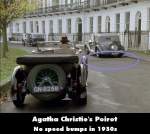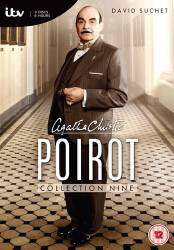The Disappearance of Mr. Davenheim - S2-E5
Factual error: Poirot reads a fake copy of the Daily Express with a big article about the mystery disappearance. What makes it a not so believable fake, besides the odd artwork instead of a picture (a clash of style with the real Express first pages), is that you can make out of the words of the article closest to the camera, and like it happens to other props used this season, it mentions the Abyssinian crisis...but saying that "Mr. Churchill himself made the only speech." Churchill was not in office in the 30s. (00:17:05)
The Disappearance of Mr. Davenheim - S2-E5
Factual error: It is shown explicitly that The Disappearance of Mr. Davenheim includes the fact that before going to his study at 4:30 PM, he starts the record player, with Tchaikovsky's "1812 Overture", and that the record stops at 4:45 PM. The problem with it is that Mrs. Davenheim during the whole 15 minutes stayed in the same spot, absent-minded, and in 1935 a recording of that song would have been on a three sided 72 rpm record, since 33 rpm LPs were introduced in 1948. (00:03:15)
Factual error: One of the two police cars identified as Unit 10, is appropriately enough, a Sunbeam-Talbot Ten. The episode is set in 1935 though (with amazing accuracy for some details, including the poster for the movie "George White's Scandals 1935" shown before the car tailing starts), and that car was manufactured only after 1937. (00:19:55 - 00:22:00)
Factual error: To meet The Veiled Lady the second time, Hastings and Poirot go to the Natural History Museum. The establishing shot is the iconic "Dippy the Diplodocus", right in the main hall. But in 1935, Dippy would have been in the reptile hall instead, and with his head and neck mounted differently. (00:37:35)

The Kidnapped Prime Minister - S2-E8
Factual error: When the former Mrs. Daniels hops on her car followed by Hastings, between them you can see a speed bump, not a feature on roads in Britain (or anywhere) at the time. (00:36:55)
The Kidnapped Prime Minister - S2-E8
Factual error: The Austin used by Poirot and his company to go to the attempted murder scene and back is an Austin 18, which entered production in 1937, later than the event of this season/episode. (00:12:00)
Factual error: Nick says that she made the will 6 months before the events of the episode, just before her appendix surgery. The surgery happened on February 27th, so it would be the end of August now. But at the beginning of the first episode Hastings was reading a (movie prop) copy of the Daily Express which had on the cover "Perry makes a new record - Champion two years in succession", complete with a picture where he is unmistakably with his rival Gottfried Von Cramm. The photo (and the mention of the 2 years record) is about the Wimbledon final who took place on 5 July 1935. That's almost 2 months earlier than it should be. (00:04:45)
Factual error: Japp in this episode uses a Humber Snipe, a 1937 model. The story is set in 1935.
Factual error: Jim Lazarus drives a Vauxhall DX (14/6 Light Six) Stratford Tourer, a 1936 model. This episode takes place in the summer of 1935. (00:46:20)
Factual error: This episode happens on the first days of November 1935. During the 5th of November fireworks Hastings, Japp and Poirot walk at night through streets with plants prospering and in full green, and the same happens during the visit to the golf course.
Factual error: As Japp and his moustached pal visit the nightclub in search of Major Eustace, the song "Hindustan" is executed. While it is a song perfectly believable for the year (stated as being 1935) since it was written in 1918 and a huge hit, the version played here is quite a bit different, sounding a lot more like the upbeat version heard first in the Rosemary Clooney-Bing Crosby album "Fancy Meeting You Here", which had other classics reworked for the duet formula with added lyrics - exactly like in the back-and-forth heard here between the singer and the band. Said album came out in 1958, though. (00:30:20)
Four and Twenty Blackbirds - S1-E4
Factual error: At the art gallery, Poirot and Hastings are looking at a painting identified as "Man Throwing a Stone at a Bird" by the surrealist Joan Miro. But the painting featured is completely different from the real one. (00:21:50)
Factual error: The prologue shows the dubbing of a newsreel by a narrator. Ten years later it's 1936. But in 1926 Hollywood was still experimenting with sound film, and a UK news reel would've been silent. (It was 1929 before any sound films were made in Europe).
Factual error: Poirot has just suffered "a turned ankle", in his words; he's talking with Hastings and the kind woman who helped him out, when their conversation gets perturbed by the noise of a plane. Which is surprising, since the plane in question is a Volmer VJ .22 Sportsman, a plane from the 50s, way after the 1930s setting of the episodes. (00:06:40)

Factual error: Poirot is cycling through Wimbledon; he passes by a house which has a definitely non-1930 car in the yard, and a yellow alarm box on the first floor. (00:18:20)
Four and Twenty Blackbirds - S1-E4
Factual error: Great accuracy went into the dates of this episode - Hastings is following the outcome of the so called "Verity's Match", the 2nd test of the 1934 Ashes series, Australia vs England. The events then should happen between the 22nd and the 25th of June, 1934, compatible with the murder happening on the 16th, and being discovered 3 days after. This however puts it a year before "Murder in the Mews", previous episode where Poirot's dentist was referenced, and that happened in 1935 as stated in the letter to the Chinese laundry.
Factual error: When Poirot leaves customs with Mademoiselle Lyall, one of the supposed Italians asks in that language "What's happening, what is this noise?", which does not make sense in context, especially with the officer just shrugging and showing him the card. (00:32:55)
Factual error: The mysterious venom used to perpetrate the murder comes according to the English coroner from a "Vilitilio Occius", said to be a horn viper. Nothing wrong with artistic liberties making up animal species, but the name itself appears to be pseudo-latin with no real meaning or any closeness to other snakes, so not a particularly believable one.






Answer: He definitely says "Belgian", but the subtitles get it wrong and show him saying "American."
Wblank71